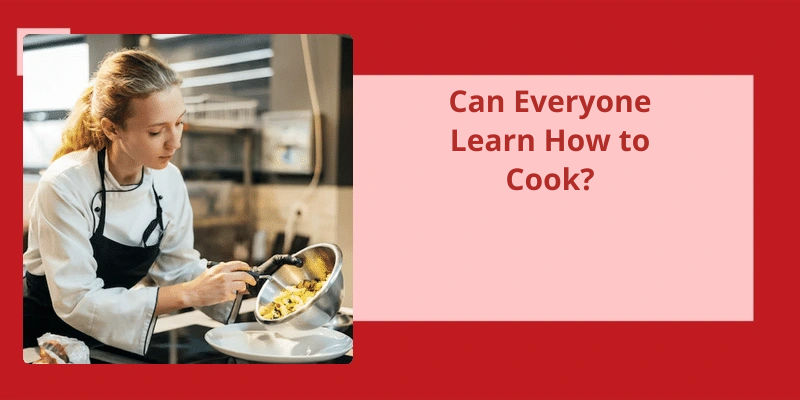Cooking is an art that can be mastered by anyone with determination, patience, and the willingness to learn. There’s an implicit assumption that only a few gifted individuals are capable of cooking delectable meals, but this belief isn’t entirely true. The truth is, almost everyone can learn how to cook, irrespective of their current knowledge or skill level in the kitchen. Indeed, some of the most accomplished chefs in the world started as amateurs, fumbling with spices and ingredients before perfecting the craft. Like most skills, cooking requires practice, experimentation, and attention to detail. Those who tend to struggle with cooking are often those who don't invest enough time or effort in refining their skills. However, passion and curiosity can go a long way in transforming an ordinary cook into an extraordinary one. With the right mindset, anyone can augment their culinary skills and amaze their taste buds and those around them.
Can Anyone Learn How Do You Cook?
Cooking is an essential life skill that everyone should master. Many people think that cooking is difficult and requires years of training and practice. However, the truth is that anyone can learn how to cook with some effort and dedication. The key to becoming a good cook is to start with the basics, and then gradually build on your skills and knowledge.
One of the best ways to learn how to cook is to find a good cookbook or cooking website that offers detailed instructions and step-by-step recipes. These resources provide a wealth of information that can help you improve your cooking skills quickly and easily. Additionally, many cooking classes and workshops are available to help you learn how to cook from experienced chefs and cooks.
When you first start learning how to cook, it’s important to focus on simple recipes that are easy to follow. This will help you build your confidence and develop your skills without getting frustrated or overwhelmed. As you become more comfortable in the kitchen, you can move on to more complicated recipes and begin experimenting with your own unique creations.
The Benefits of Learning How to Cook for Your Mental and Physical Well-Being
- Improves mental health and reduces stress levels
- Allows for greater creativity and self-expression
- Promotes a healthier diet and better eating habits
- Increases feelings of independence and self-sufficiency
- Provides an opportunity to socialize and connect with others
- Develops useful life skills that can be passed down to future generations
Not only does cooking allow you to control what goes into your meals, but it can also save you money and be a fun and enjoyable activity. However, many people find cooking intimidating or don’t know where to start. In this article, we will explore why it’s important for everyone to learn how to cook, and provide some tips and resources to help get you started.
Is It Important for Everyone to Learn How Do You Cook?
Many people are hesitant to learn how to cook because they feel like it’s too complicated or time-consuming. However, cooking doesn’t have to be a daunting task, and it’s a skill that anyone can acquire with practice. Not only does cooking at home allow you to have greater control over what you eat, but it also helps you save money. Eating out can be expensive, and cooking your own meals can be far more economical. Additionally, learning to cook can be a fun and creative outlet for self-expression, as you can experiment with different ingredients to create unique and delicious dishes.
By learning how to cook, you also gain greater independence and autonomy. When you know how to cook for yourself, you don’t have to rely on prepackaged meals or fast food when you’re short on time. Instead, you can prepare meals in advance and have them ready to go whenever you need them. Not only does this save you time, but it also allows you to enjoy home-cooked meals even when you’ve a busy schedule.
When you cook for others, you’re showing them that you care and that you want to nourish their bodies and souls. You can also learn about different cuisines and food traditions from around the world, expanding your culinary knowledge and appreciation.
Whether you’re a novice in the kitchen or an experienced cook, there’s always more to learn and explore. So why not start today and discover the joy of cooking for yourself and others?
The Benefits of Cooking With Fresh Ingredients and Avoiding Processed Foods
- Fresh ingredients provide better nutrition for your body
- Avoiding processed foods can decrease the risk of chronic diseases such as diabetes, heart disease, and certain cancers
- Cooking with fresh ingredients can enhance the flavor and texture of your dishes
- You’ve more control over the ingredients and can customize your meals to your preferences
- Using fresh ingredients can support local farmers and promote sustainability
- Cooking with fresh ingredients can be a fun and rewarding hobby
It’s important to dispel the myth that some individuals are just inherently good at cooking while others can never quite master it. Rather, becoming a skilled cook requires dedication and practice. While some people may have a slight advantage in certain areas, the majority of cooking abilities are learned and developed over time.
Can Someone Be Naturally Good at Cooking?
That being said, some people might have more of a knack for cooking than others. Maybe they grew up in a household where cooking was a big part of their culture or tradition, and so they picked up some skills just by being around it. Or maybe they just have a natural curiosity and love for food that’s led them to experiment and try new things in the kitchen.
It’s also worth keeping in mind that cooking is a highly subjective art form. What one person considers “good” might not be the same as what someone else considers “good.”. Some people might prefer dishes that are rich and heavily seasoned, while others might enjoy lighter, more delicate flavors. Someone might be really skilled at making French pastries, while someone else might be a whiz at making homemade pasta. So even if someone is naturally good at cooking, their skills might not necessarily translate to every type of cuisine or dish.
It involves not just technical skill, but also creativity, intuition, and an understanding of flavors and ingredients. While some people might have a head start in one or more of these areas, anyone can become a good cook with time, practice, and a willingness to keep learning and experimenting. So whether youre a beginner or an experienced chef, don’t be discouraged if you don’t feel like youre naturally talented – with practice, you can get there.
In fact, many professional chefs will tell you that they didnt start out as natural-born cooks. They worked hard to hone their skills, and they continue to do so every day. Cooking is a craft that requires dedication and effort to master, but the rewards are worth it. Not only can you impress your friends and family with delicious meals, but you can also find a sense of satisfaction and creative fulfillment in the process of cooking. So whether youre a novice or a seasoned pro, just keep at it – and don’t be afraid to make mistakes along the way.
The Science Behind Cooking: How Temperature, Time, and Ingredients Affect the Final Result
Cooking is a process that involves several factors that significantly affect the outcome of a dish. Temperature, time, and ingredients are three of the most critical variables in cooking. The choice of ingredients determines the flavor and texture of the final result, while temperature and time affect the cooking process’s pace and intensity. Understanding the science behind cooking can help create delicious and consistent dishes by finding the perfect balance between those different factors.
Cooking is a basic skill that one should possess to live a healthier life. However, a considerable number of adults lack this skill, which can lead to unhealthy eating habits and poor food choices. In this article, we will delve into the reasons why many adults don’t know how to cook and the consequences that come with this knowledge gap. We will also explore the benefits of learning how to cook, and ways to acquire basic cooking skills.
Do Most Adults Know How Do You Cook?
Cooking is an essential life skill that everyone should know. However, recent studies have shown that a significant number of adults don’t know how to cook. This finding is quite startling, given that cooking is a fundamental aspect of human survival and wellbeing.
Not knowing how to cook can have negative consequences on a persons health and wellbeing. People who don’t cook tend to rely on fast food, processed foods, and takeaways. Such foods are often high in calories, salt, and unhealthy fats, which can increase the risk of developing various health problems such as obesity, heart disease, and diabetes. Additionally, eating out regularly can be expensive, which can strain a persons finances.
Some may never have been taught how to cook by their parents or guardians, while others may have had a negative experience with cooking and therefore avoid it. Whatever the reason, it’s never too late to learn how to cook. There are numerous resources available on the internet and in cookbooks that can provide step-by-step instructions on how to cook a wide range of meals.
It’s an art that involves creativity, experimentation, and an understanding of flavours and textures.
The Importance of Teaching Children How to Cook From a Young Age
- Teaches children important life skills
- Promotes healthy eating habits
- Encourages creativity and experimentation in the kitchen
- Fosters family bonding through cooking and meal preparation
- Empowers children to make independent food choices and feel confident in the kitchen
- Prepares children for future independence and self-sufficiency
Conclusion
While some may be naturally inclined towards it, it ultimately comes down to practice, experimentation, and dedication. The idea that only a select few can cook well is nothing but a myth. With enough effort and attention to detail, anyone can become a skilled cook. The passion for cooking is what drives individuals to improve and to excel at their craft. It’s the love for the art of cooking that makes a person pay attention to the nuances and subtleties of the ingredients, recipes, and techniques.






